Home > Articles > The Archives > The Bailey Brothers: Part 1
The Bailey Brothers: Part 1
Reprinted from Bluegrass Unlimited Magazine
July, 1970. Volume 5, Number 1
(This article was compiled from an interview with Charles Bailey in Wilmington, Delaware and a letter written by Danny Bailey, Knoxville, Tennessee.)
If you should ever sit down and compose a list of musicians undeserving of neglect, Charles and Danny Bailey could not be overlooked. Until now little has been known about this brother act whose contributions to the music world have been immeasurable.
The Bailey Brothers were born and raised in Hawkins County in East Tennessee at the foothills of the beautiful Smokey Mountains. Their birthplace was in the rural region called Happy Valley. Charles L. Bailey was born on February 11, 1916 and his younger brother Daniel E. on December 1, three years later. Sons of a farmer and from a family of twelve children, Charles and Danny decided to become musicians early in their childhood.
“I guess we just kinda fell into music … our mother played the five-string banjo but it was the old drop-thumb style like Stringbean and the ones that came along later. We kinda inherited our musical background.”
About 1935 the brothers began their career. Charlie remembers, “I bought a guitar for a dollar and a half. It was a used one … a Silvertone, that’s a Sears Roebuck that they used to make. And believe it or not, I learned to tune it myself. I would get out under the old apple tree … they would think I was workin’, but I wasn’t, actually I was trying to learn to play the guitar. My father would catch me on occasion and put me back to work.”
At ice cream suppers, church homecomings, community affairs, singing conventions and amateur contests Charlie and Danny would bring their mail order instruments and “do their thing.” This was in the days when sorghum molasses was made on the farm, and the small community would gather for the last “stir off.” While in their early teens the Baileys were invited by A. P. Carter to appear as guests at Clinch High School (which they later attended) with the Carter family. The Carters predicted they would become accomplished stage and radio entertainers.
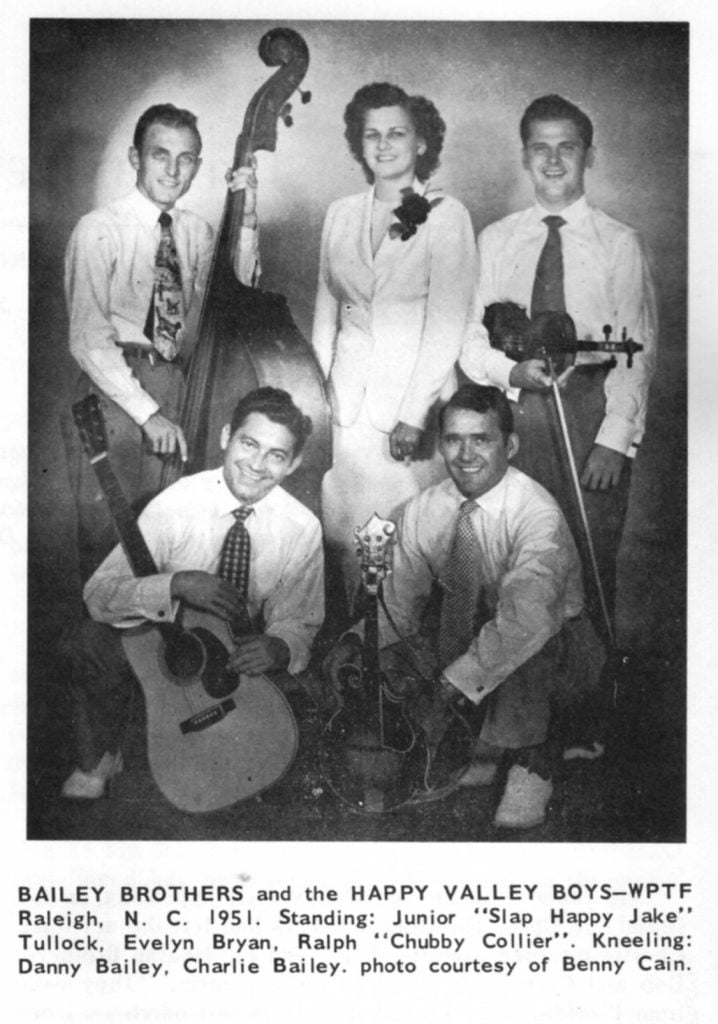
In 1936, when Danny was reluctant to leave home, Charlie started his career on the road playing music, having teamed with Charlie Cope. According to Charles, “We started out more or less hitchhiking throughout the country, playing music here and there … and we came to Baltimore and we won eight straight amateur contests on “Happy Johnny” and his radio gang program over WBAL. They were a hundred dollar first prizes each so “Happy Johnny” gave me a job. He said he could afford to pay me better to work in his band at $50 a week than he could to pay me two or three hundred dollars a week by winning two or three contests. That’s kinda how I got started.” Charles stayed in Baltimore about six months and then went to Indianapolis to work the Old Hickory Night club with dobroist Zelma McIntosh.
“When he (McIntosh) was called back to the Army … I came home. That’s when Danny and I started our own group, ‘The Happy Valley Boys’. When we first started in music together in 1937 on WOPI, Bristol, Virginia, we both played guitars on the ‘Saturday Night Hayride’. Incidentally, Tennessee Ernie Ford was a messenger boy at WOPI when we went there … well, he did part-time announcing and worked around the station.”
In 1938 they moved to the stronger WJHL (today WJCW) in Johnson City, Tennessee. The Saturday night program was a “Barrel of Fun.” The Baileys journeyed to Knoxville, Tennessee to appear on WROL in 1940. “Here’s a real rare photo of our first band … we signed the negative your friends. We used to hitchhike down sixteen blocks every morning to go to the radio station … do our program and sixteen blocks back. Things were tough, we couldn’t afford a car then. The first shows we put on cost ten cents straight admission, and the first crowd we played to we made thirty-nine dollars … three hundred ninety people. Oh boy, we thought we were getting rich. Thirty-nine dollars in one night was pretty good money.”
Charlie and Danny advanced to the better known WNOX in Knoxville in late 1940 (a station that has been the training ground for Jim and Jesse McReynolds, Charles and Ira Louvin and so many more significant entertainers.) Smiling Eddie Hill hired the Bailey Brothers on the Tennessee Bam Dance. While appearing at WNOX, the first Happy Valley Quartet was formed with Charlie Bailey singing lead; Danny Bailey, tenor; Junior Gladson, baritone and Ernie Ford, bass.
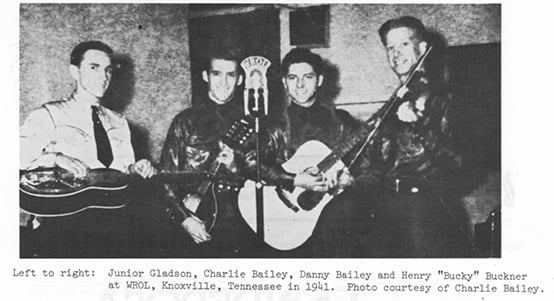
“When we first went to Knoxville, we tried to get on with Cas Walker (the grocery store magnate) … he had Esco Hankins and his group working for him at the time. Cas wouldn’t even talk with us … so we started out with S.L. DeArmond Grocery, which was right next store to Cas, and the Hope Battery Company. After we worked for S. L. DeArmond for a while, his grocery started doing about three times the business Cas’ store was right beside it. So then Cas came to us … I was kinda independent too, so I made Cas come back about the third time, after he upped his price a couple of times … before we started with him in March of ‘41.”
In the latter part of 1941, the Bailey Brothers were offered a job at WSM Grand Ole Opry but declined the invitation until a second time. After Charlie and Danny finally decided to accept, as fate would have it, Charles was beckoned by the Army on August 21, 1941.
“I was inducted … they come after me. I went reluctantly, but then Dan didn’t want to go to the Opry. I told him to go ahead because it was a big break … he finally agreed and hired the Cope Brothers to more or less take my place. Charlie Cope played mandolin and Lester played the guitar and our bass fiddle and sang lead. Curley King was hired after Dan went to Nashville … he was from Missouri and one of the greatest fiddlers in the country. They carried on ’til I come back from the Army, then I joined Danny at the Grand Ole Opry in 1945.”
The Bailey Brothers—Conclusion
by Gary A. Henderson and Walter V. Saunders
Reprinted from Bluegrass Unlimited Magazine
February 1971, Volume 5, Number 8
The information contained in this article was compiled from interviews with Charlie Bailey on March 21, 1970 at his home in Wilmington, Delaware and further collaboration in a letter from Danny Bailey.
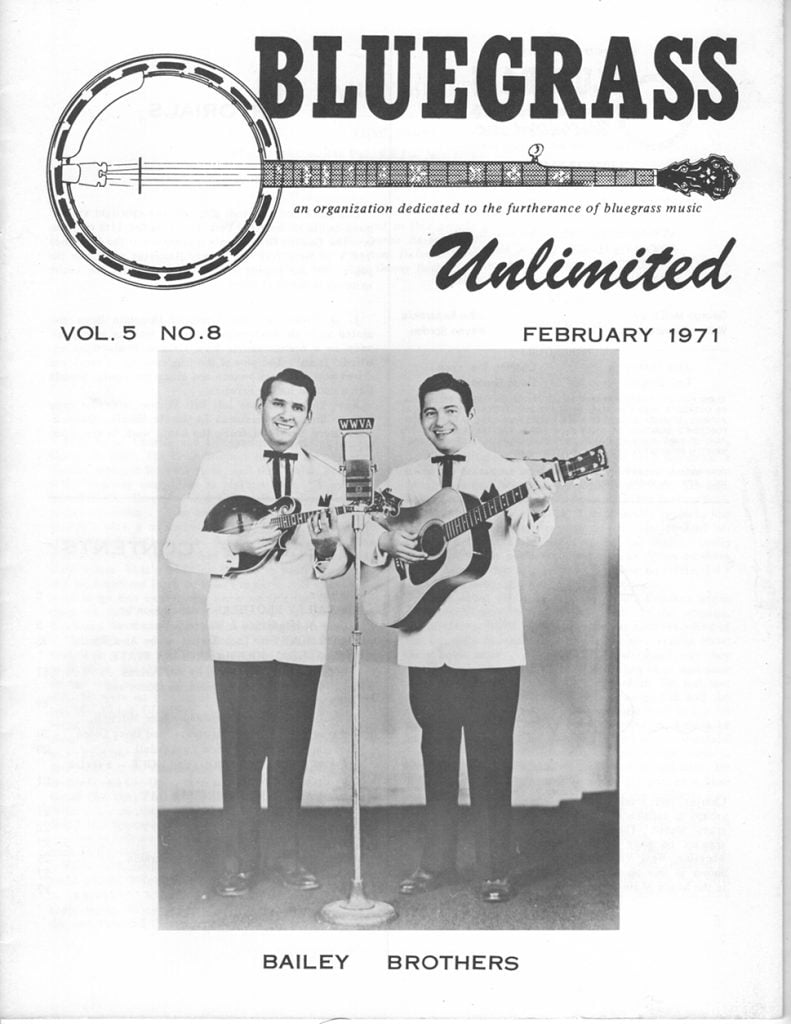
1946 found Charlie and Danny still appearing on the Grand Ole Opry. The Cope Brothers had left the act when Charlie returned from the Army, and the Healan Brothers, Bob and Gerry were hired to replace them. “They were from Florida. They played a little more modern . . . one played mandolin … he was very, very good. In fact, I wouldn’t play a mandolin in front of him . . . and the other played rhythm guitar. Junior Husky was our bass player . . . and then we had Joe Jones on the electric steel guitar. That’s when we started to switch over . . . and we found out later we didn’t really … I guess . . . want to go that modern. So when we left the Grand Ole Opry we didn’t take Joe with us … or the Healan Brothers. We went back to our old style of singing.”
The Baileys went to Albany, Georgia, where they worked on station WALB. “We got Slim and Wilma Martin to go there. We played the Grand Theater in Albany . . . we put on 7 shows, and turned people away on the last one. We were on this local radio station . . . had just left the Grand Ole Opry, and of course we mentioned being formally of the Grand Ole Opry . . . they was about to get after us for sayin’ we was formally … or they tried to get after us. I had a pretty good lawyer there too … he said if they can prove you haven’t been on the Grand Ole Opry, then you can’t use formally of the Grand Ole Opry. So they couldn’t prove we hadn’t been there … so they didn’t bother us anymore. Dan, he didn’t like Georgia. We were really doin’ very, very good . . . but he left me . . . then I followed him, and we went back to Knoxville for Cas Walker.” The year was 1947.
While in Knoxville, Charlie and Danny hired their first banjo player, Wiley Birchfield. “We was one of the first . . . I guess … to have what we call the modern 5 string banjo picker. Wiley … he was from North Carolina. He’s the one that did “Happy Valley Special” with us. He was very good. He was on the Earl Scruggs style, but a little bit different. We always tried to keep our music a little bit different, but naturally if you idolize somebody like he did Earl Scruggs, you gotta play a little like him. I think maybe he learned more from Snuffy Jenkins . . . he had seen Snuffy play, and I think Snuffy inspired him to pick, then he come to more or less idolize Earl because he heard Earl more than he did Snuffy. Snuffy wasn’t as widely publicized as Earl was.” Other members of the band at that time were L. E. White on fiddle, Jake Tullock on bass, and Carl Butler on guitar.
It was about this time that the Bailey Brothers began their recording career. Included in the initial session, cut at station WOPI in Bristol, was the first recording of the Louvin’s famous “Alabama”. “It was written about their home state … so I can’t understand why they wouldn’t want to record this number. They came and gave it to us and asked us if we’d record it. We had just started with Rich-R-Tone. If Jim Stanton had had the money to really distribute it, we would have had a hit there … he didn’t have a great distribution. I think he maybe got up as far as Washington and maybe Maryland . . . Kentucky, Tennessee, Virginia and a short ways in Carolina, but he didn’t have a national distribution. He didn’t have the money, and he never did pay us a dime . . . but it wasn’t so much that. We got the publicity from it . . . and people have connected us with “Alabama”, that we wrote it. We didn’t, but we put it out first, and everybody else that put it out . . . people thought they were tryin’ to copy us and they kinda resented it. Well, after ours started goin’ so good, the Louvins recorded it, and then the Blue Sky Boys asked us for it, but ours still outdone the both of them, no more distribution than Stanton had.”
Another significant recording from that session was the beautiful “Sweetest Gift A Mother’s Smile” written by Grady and Hazel Cole. “We were the first to record it. We gave it to the Blue Sky Boys and they did record it on Victor, I believe, but we gave them the words to it. This was one of our most popular tunes when we were in North Carolina on WPTF in Raleigh”. Also from the WOPI session came “John Henry”, one of their most unique numbers. “Carl Butler and I recorded that. Carl sang lead and I sang the high tenor, which is very unusual because Danny sings tenor normally, but on this one I guess I just kinda outdone myself and got the high yodel, which normally I can’t do. We just kinda rearranged this around to suit ourself.”
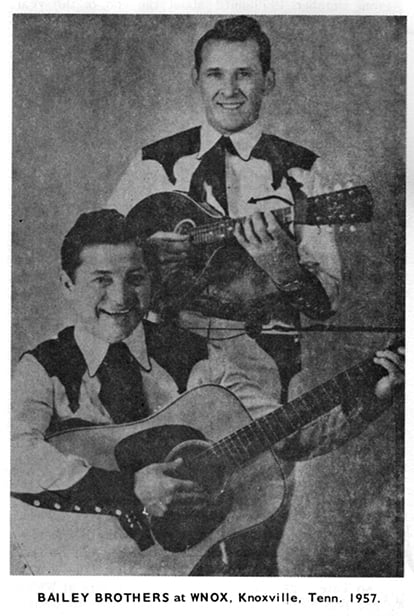
The Baileys were still appearing in Knoxville when they cut their second session for Rich-R-Tone. It was the last recordings they were to make for Jim Stanton. Unfortunately, 2 sides were all that were ever released. “Rainbow Of My Dreams was written by Tommy Scott, and I sang that first. I think maybe Lester Flatt recorded that, but I sang it on the Opry. Tommy used to be Danny’s booking agent . . . and he had the talking doll, if you remember. He was a very good entertainer.
“Anyhow, we stayed with Cas (Walker) for about a year . . . maybe a little longer . . . and I’ve always had itchy feet, I guess … so I told Dan we should branch out and get on out . . . get on a bigger station.” In January 1949, they moved to Raleigh, North Carolina, where they began appearing over station WPTF. “Wiley wanted to stay in Knoxville, so we got Willis Hogsed from Georgia to play banjo. He was one of the very finest . . . I mean he had a style. What I call a good banjo picker is somebody like Johnnie Whisnant or Willis Hogsed, that branches out and gets a style of their own . . . somebody who don’t copy somebody else.
In Raleigh, L. E. White left them, so they hired Tater Tate to play fiddle. “Tater was playin’ around Knoxville … I believe maybe he’d been with Carl Butler. Hoke Jenkins came with us after Willis Hogsed left. Willis was inducted into the Army, and we got Hoke. Jim and Jesse had started out with Hoke in Augusta, Georgia . . . it was Hoke Jenkins and his band. When Jim and Jesse left Hoke, that’s when Hoke came with us in Raleigh and worked with us a little there. He was one of the few banjo players that can play banjo without using a capo on it … he could play anything.”
In 1950, Charlie and Danny started their own record label, which they called Canary. “We couldn’t get anybody else to record us so we just started our own”, Charlie says laughingly. “We wanted to branch out on our own. We had to come all the way to Johnson City or Bristol to cut the masters (for Rich-R-Tone) and we just thought it would be easier to do our own.” Out of their first session came the powerful “Hallelujah, We Shall Rise”, the only quartet the Baileys ever recorded.
Charlie breaks up with laughter when he relates an incident that happened in Raleigh while Hoke Jenkins was still with them. “He couldn’t find an apartment. There was an apartment advertised in the paper and he went out there. Hoke said “Yeah, I like the apartment, I’ll take it” . . . and the old lady said, “Do you have any children?” … he said “Yeah, I got 4” . . . and she said “No … no children”. Hoke said “I’ll tell you what we’ll do. We’ll get rid of ’em. You hold ’em and I’ll chop their heads off” . . . the old lady was about to kill him. Anyway, Hoke couldn’t find a place to live so he had to go back down to his home.”
“When Hoke left, then I heard about Johnnie (Whisnant). I’d been home to Knoxville and someone there gave me Johnnie’s address. He was in Lenoir, North Carolina at this time, so I went by and he was workin’ in a garage . . . he’s a pretty good mechanic. He was all greasy and dirty … I went up and said “Are you Johnnie Whisnant?” and he said “Yes” … I said “I’m Charlie Bailey, we’re lookin’ for a banjo player”. He said “Well, I don’t know . . . I’ve got a job here.” I said “Well, I need a banjo player … if you’d like to go, I’d like to have you”. I’d never heard him, but I’d heard of him . . . that he was a good banjo player. So he just went in and told the boss, “Well, I’m leaving”. I said “How long will it take you to get ready?” and he said “Give me 30 minutes” and I said “O.K., I’ll wait for you”. He goes home and cleans up and we strike out for Raleigh.” It was the spring of 1951.
While they were in North Carolina, the Baileys had a female vocalist with them named Evelyn Bryan. “She was a very good singer. Her and Dan done quite a few duets and she done a lot of solos. She did “I’ll Still Write Your Name In The Sand” . . . this is where Mac Wiseman picked this up. She introduced it, and Mac picked it up later. She played bass fiddle occasionally . . . when Jake was dressin’ for comedy or somethin’ . . . she really didn’t play . . . she beat on the bass fiddle.
“She was really great. Her and Dan has a number . . . well, Hank Thompson came out with “Wild Side Of Life” then Kitty Wells came out with her first hit “It Wasn’t God Who Made Honky Tonk Angels”. Now she would sing this part, and Dan would sing the Hank Thompson part . . . they made a duet out of it. She had a style of her own . . . she was very, very good. She was Dan’s fiancee’ there for a long time.”
In December, 1951, the band moved to Roanoke, Virginia, and began playing on WDBJ. “Then we picked up Ed Amos on fiddle.” Shortly after this, Charlie and Danny began talking about moving to Wheeling. “Johnnie (Whisnant) hadn’t been married too long at this time. He married a girl from Knoxville, June. She … I guess . . . probably didn’t want to go up to Wheeling . . . but, anyway whatever the reason was, Johnnie didn’t want to go up there, so he left. Now Ed Amos had come in as a fiddle player, but I really needed a banjo player, when Johnnie left us. Ed couldn’t fiddle for nothin’, but he picked up a banjo and he could play the devil out of a banjo. Then I got Joe Stuart and Billy Wiltshire . . . and we had twin fiddles. We were only in Roanoke about 3 months. We switched places with Lester and Earl . . . they were there, and they went to Raleigh, and we took Roanoke”.
In April of 1952, the Baileys moved from Roanoke to Wheeling. “Our first date at WWVA was April 13 … a Saturday night. Joe Stuart went back with Bill Monroe, and Billy Wiltshire went back to Roanoke … he lived around there. Tater Tate had gotten out of the service . . . so Tater was with us all the time we was at WWVA. We got Don McHan to play banjo . . . after we went to Wheeling. Don stayed with us until Dan had to quit traveling. And we still had Jake Tullock on bass”.
The last Canary session was cut in 1953, while the group was appearing on WWVA. “The guy who wrote “Hearts Hall Of Fame” … he did it on our show one night . . Marvin Rainwater. He came down and he asked us to record this. He booked us a lot of dates around Washington and Alexandria, Virginia … or his brother did. “Bleeding Heart” was written by a Canadian. Quality, the Canadian label, was pushed over in Canada. That was the only leasing in Canada.” Shortly after this, they cut their last commercial recording as a team, “Have You Forgotten”. It was released on a WWVA souvenir variety record, together with cuts by Roy Scott and Hardrock Gunter.
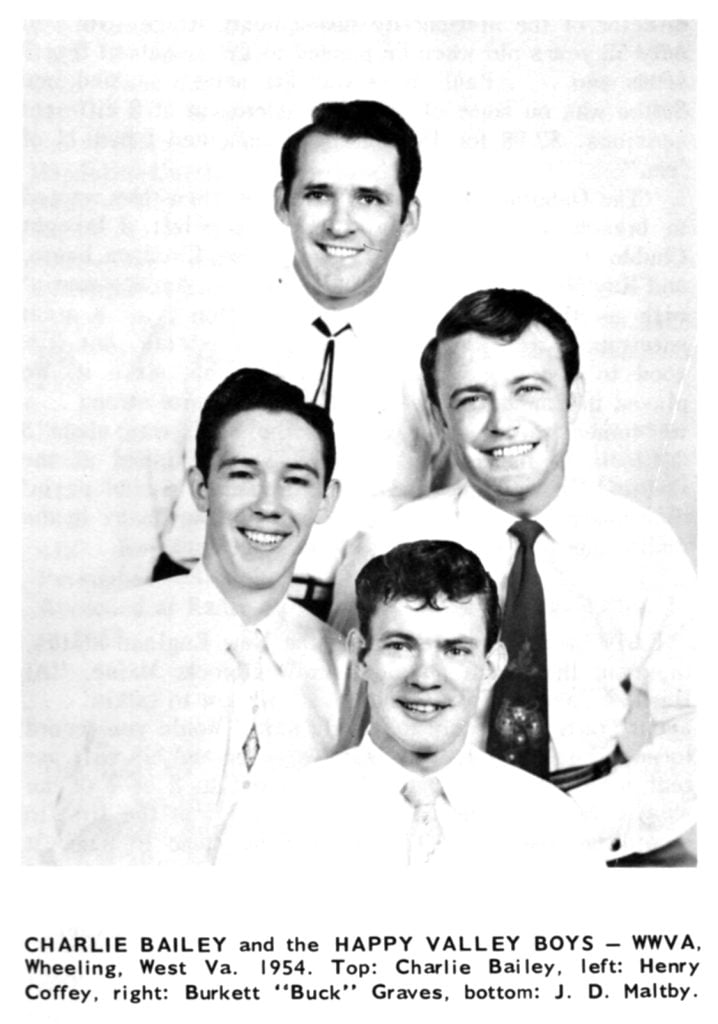
With Danny in ill health, the band broke up. The Baileys returned to Knoxville. “After we quit Wheeling, right after Dan had to give it up, Jake (Tullock) came around and he wanted us to go back together, but there never was too much around Knoxville for a musician. I mean . . . you can get a salary on the TV or radio station . . . but for personal appearances then … it was just dead. Now it’s much better, I think. Tullock tried to get Dan and me to go back in it. Dan couldn’t travel and I didn’t want to stay tied down around Knoxville, so then I got my own band.”
“The 5 string banjo player was Henry Coffey from Morristown, Tennessee . . . J. D. Maltby was a very good fiddler similar to Tater Tate style … in fact, he’s from Tater’s home town, Gate City, Virginia. I had Buck Graves on dobro … I knew Buck from way back … he used to play with Esco Hankins. When he left Stoney and Wilma Lee . . . they went to the Opry about that time or somethin’ happened that he left them, and I picked him up . . . and we went to Wheeling. That was one group right there that I’d love to get back together today. They were solid musicians.” They stayed in Wheeling about 3 months.” Buck left me and J. D. Maltby and Henry Coffee . . . well, they got homesick and went back home.”
For a short time, in mid 1954, Charlie returned to Knoxville, and teamed up with Danny again. It was while they were appearing for Cas Walker that Dolly Parton made guest appearances on the show. “The first time she ever sang on the show she was about 8 or 9 years old. She was a very good singer . . . when she’d come out, Cas would say ‘We have little Miss Dolly Parton, she’s gonna do a number here’ . . . she just guested on the show with us.”
In late 1954, Charlie was back on his own, playing on the WRVA “Old Dominion Barn Dance’’ in Richmond, Virginia. “This is where I had the McCumbee sisters and their brother, Sonny McCumbee . . . that’s the same time Reno and Smiley and Mac Wiseman was there. We were there about 6 months.” In mid 1955, he went back to WWVA. “Carol McCumbee got married, and the others left . . . Phyllis McCumbee stayed on . . . she played the accordian . . . that’s when I got Bob and Sonny, the Osborne Brothers.” In late 1955, they cut some hymns for one of the WWVA souvenir package offers. On “After The Sunrise” . . . the guy singin’ bass was the program director of the station. He had a heart attack. He was only 52 years old when he passed away . . . about 6 or 7 years ago . . . Paul Myers was his name . . . and Lee Sutton was on some of ’em. They were cut at 2 different sessions. $2.98 for 18 Country Hymns, and I had 11 of ’em.”
“The Osbornes worked for sometime, then they wanted to branch out on their own. When they left, I brought Chubby Collier in on fiddle, and Jimmy Elrod on banjo, and Ray Myers, the armless musician … he was tourin’ with us then. He was a great attraction … a great entertainer. He wasn’t the greatest musician, but it’s good to see a guy handicapped like that make it. We played in Canada and we’d built him up quite strong . . . we turned people away after 7 shows. It was about 3 O’Clock in the mornin’ when we got finished at the theater. He was the kind of guy you didn’t mind payin’ the money to . . . ’cause he would put that many in the auditorium for you, just to see him perform.”
Early in 1956, while touring the New England states, they cut the Event sessions in Westbrook, Maine. “Al Hawkes came out to our show … we got to talkin’ . . . about starting a record label. He said ‘Would you record for me?’ and I said “Why, sure” … he and his wife are real nice people . . . they’d been out to 3 or 4 of our shows. So we recorded for him … I was the first to record on his label. This is how he came to name it Event. He said “Well, I’ve got Charlie Bailey and the Happy Valley Boys . . . this is some event” . . . and his wife said ‘Well, why don’t you call the record Event?’ So he named it Event Records.”
In 1957, Charlie and Danny teamed up for the final time. “We went back to the Tennessee Barn Dance and CBS Country Style . . . coast to coast network on Saturday night in Knoxville, WNOX.” In September of 1957, BU’S Pete Kuykendall was travelling through the south and visited the Baileys while they were appearing on the Mid-Day-Merry-Co-Round. Pete sat in as fiddler on their show, along with regulars Larry Mathis on banjo, and Ray Atkins on bass. During this show, a tape recording was made of 4 songs, which still stand today as possibly the best examples of the Bailey Brothers sound. The numbers were “Take Me Back To Happy Valley”, “Midnight On The Stormy Deep”, “Little Maggie”, and “No Disappointment In Heaven”.
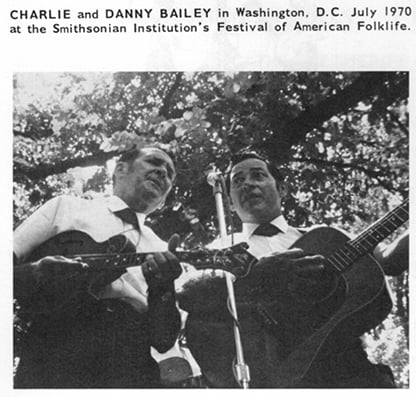
1958 found Charlie working in Canada. “I went to Canada as a DJ on one of the stations over there. I took a tour in the Maritime Provinces . . . that’s up in Nova Scotia, New Brunswick, Newfoundland . . . the band at that time was Ross Bennington . . . he’s a banjo player from Canada, and Jimmy Chapman, a fiddle player. And then, I called Joe Stuart . . . and he came up, and of course Joe can play banjo, fiddle, mandolin or anything. This is when we really clobbered ’em … on this tour. I was there about 6 months … in fact, I almost didn’t get out of Canada . . . without filing papers over there as a citizen. I just barely got back into the U. S., ’cause I stayed a little bit over 6 months . . . you gotta come back every 6 months. I came back in early ’59, and the Bunkhouse Gang was gonna come with me. I had worked with them every time I had went up there. I had been goin’ up there from ’53 on, and I had worked with them when I was a DJ. They was a very popular group. They was gonna come down to Wheeling with me, when I came back . . . that’s when I kinda laid it aside, you know. I came back home and got a job sellin’ cars . . . new Buicks.”
From October 1959 until about the end of the year, Charlie sold cars. “Then I got itchy feet again, and this is when I got Mildred and Lou (Wells) . . . the sister team, that came with me to Maryland . . . and Delmas Bailey, a banjo picker. Del’s a distant cousin of mine . . . but at that time I didn’t think we were related. I’d always say “His name’s Bailey and my name’s Bailey, but we’re no relation” . . . then later I got a book of the family tree and he is about a 4th cousin … a very good banjo player . . . but he had to go back home. Then I got Johnnie Whisnant . . . Johnnie and I and the sisters . . . we were on our way to Canada. I was gonna get back in it real heavy again. So their father had a heart attack and they had to go back to Tennessee. This was in February … so while they were gone, I had to find something to do and I went to an exterminating school. So that’s how I wound up where I am now as an exterminator.”
While Charlie has his business in Wilmington, Delaware, Danny is located in Knoxville, where he still works for Cas Walker. “If every town in the United States was as good to everybody else as Knoxville is to Dan, nobody would ever move.” Although separated by hundreds of miles, the Baileys get back together occasionally to do a show. The most recent was the Smithsonian Institution’s Festival of American Folklife at Washington, D.C., July 2 and 3, 1970. They also appeared at Shindig at Cripple Creek on July 4th. “I think I enjoyed playing at the Smithsonian more than anyplace I ever played . . . even though as much money as we’ve gotten maybe for a show here and there, I enjoyed the Smithsonian, without any compensation. I was compensated so very much by meet- in’ the people that I met down there. It just made it really a homecomin’ for us.” The Baileys were so very well received at the shows they played last year, that Charlie is forming a new band, and plans to make some personal appearances this summer. Who knows? Perhaps Danny can be persuaded to join him for a few dates. Perhaps, once more, we will hear the beautiful, haunting harmonies of the Bailey Brothers.
Share this article
1 Comment
Leave a Comment Cancel Reply
This site uses Akismet to reduce spam. Learn how your comment data is processed.
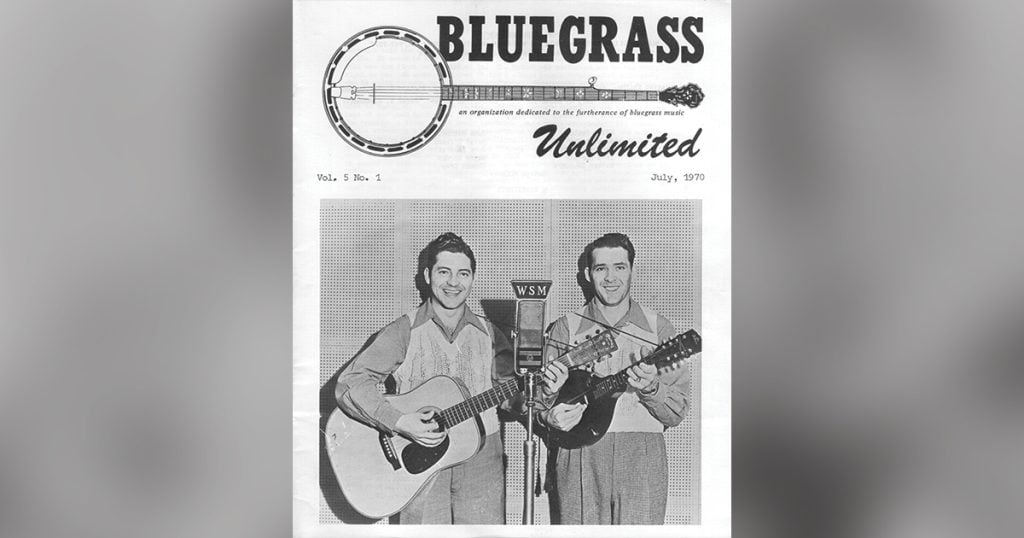
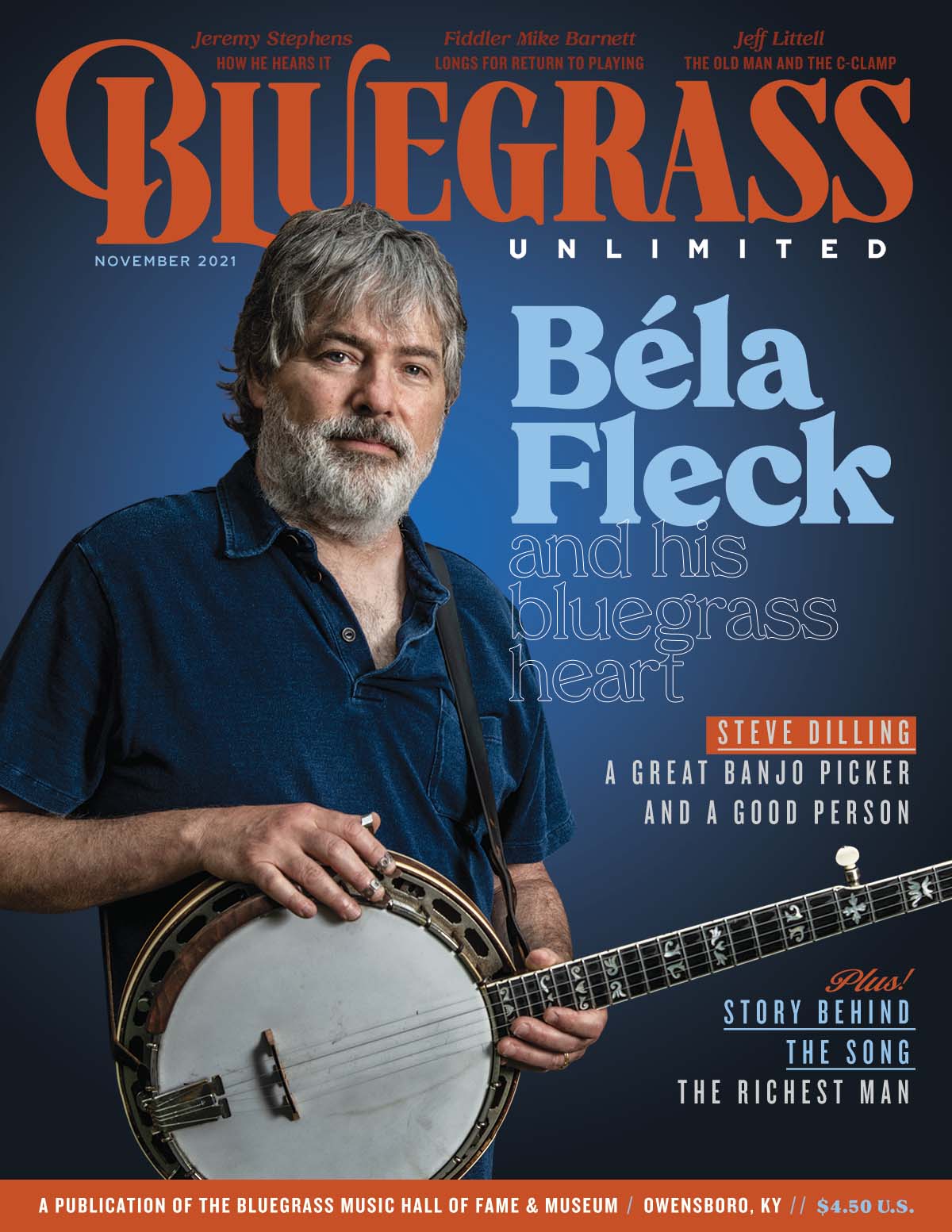
My name is Duel w Hilton just wonted to say that theses guy was grate in music . Charle Bailey he came to my dad house to hire me and my brothers to go to the Opry to start his band up agin after his brother had died so we was going to do it but he got sick and died but he hired all of us to be his band . He was on his way back to Nashville Tennessee in his old days .